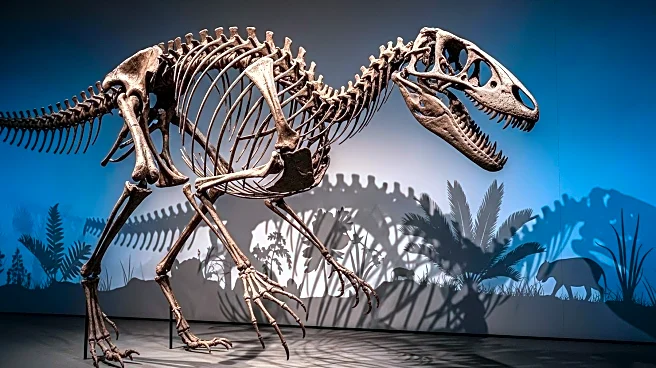What's Happening?
A newly discovered dinosaur species, Joaquinraptor casali, has been unearthed in Patagonia, Argentina, providing significant insights into the evolution of apex predators. This dinosaur, part of the megaraptorans family, lived approximately 67 million years ago and was a formidable predator, as evidenced by a crocodile bone found in its jaws. The fossil, discovered in 2019, is one of the most complete megaraptoran skeletons ever found, preserving much of the skull, jaws, vertebrae, ribs, and limbs. Joaquinraptor casali's anatomy, including its powerful arms and claws, suggests it was well-adapted for hunting, differing from its relatives like the Tyrannosaurus rex, which relied more on its bite.
Why It's Important?
The discovery of Joaquinraptor casali is crucial for understanding the diversity and adaptation of large predators just before the mass extinction event that ended the age of dinosaurs. It highlights the evolutionary paths different dinosaur families took to become apex predators. The fossil's completeness allows scientists to fill gaps in the evolutionary history of megaraptorans, providing a clearer picture of their growth patterns and ecological roles. This research also offers insights into ancient predator-prey relationships, which can inform current biodiversity studies and conservation efforts.
What's Next?
The findings from Joaquinraptor casali will likely lead to further research into the megaraptorans and their ecological niches. Scientists may conduct more detailed studies on the fossil's growth rings to understand its life cycle better. Additionally, the discovery could prompt new excavations in Patagonia to uncover more about the region's prehistoric ecosystems. The research community will continue to explore how these ancient predators adapted to their environments, potentially offering lessons for modern-day ecological challenges.
Beyond the Headlines
The discovery of Joaquinraptor casali not only enriches the scientific understanding of dinosaur evolution but also underscores the importance of paleontological research in uncovering Earth's biological history. The fossil's preservation and the evidence of its diet provide a rare glimpse into the complex food webs of the Cretaceous period. This research could influence how scientists model ancient ecosystems and their responses to environmental changes, offering parallels to contemporary ecological shifts.










